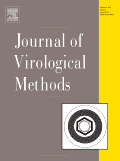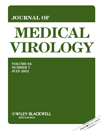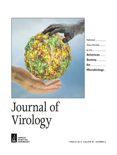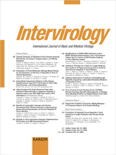
VIROLOGIE
Scope & Guideline
Innovating insights in virology and treatment.
Introduction
Aims and Scopes
- Viral Pathogenesis and Host Interaction:
Research focusing on the mechanisms by which viruses cause disease in hosts, including studies on immune responses and the molecular biology of viral infections. - Emerging and Re-emerging Viruses:
Studies that investigate newly identified viruses or those that re-emerge in populations, including zoonotic diseases and their epidemiological impacts. - Viral Genomics and Molecular Biology:
Research on the genetic makeup of viruses, their evolution, and implications for treatment and vaccine development. - Viral Epidemiology and Surveillance:
Papers that explore the spread of viruses in populations through innovative methods, including wastewater-based epidemiology. - Innovative Therapeutic Strategies:
Research on new antiviral drugs, gene therapy, and vaccine development, particularly in the context of viral infections such as HIV and COVID-19. - Public Health and Virology:
Exploration of the intersection between virology and public health, including policy implications and responses to viral outbreaks.
Trending and Emerging
- Impact of COVID-19:
Research related to SARS-CoV-2 and its effects continues to dominate, investigating aspects such as transmission, long COVID, and vaccine development. - Wastewater-Based Epidemiology:
This emerging theme focuses on the use of wastewater as a tool for monitoring viral outbreaks, gaining traction as a cost-effective surveillance method. - Gene Therapy and Editing Technologies:
Increasing interest in using CRISPR and other gene-editing technologies for treating viral infections, particularly HIV, showing promise for innovative therapeutic approaches. - Zoonotic and Vector-Borne Viruses:
A growing emphasis on understanding zoonotic viruses and their transmission dynamics, especially in light of recent outbreaks, reflects a broader One Health approach. - Neurovirology:
Research exploring the neurological impacts of viral infections, particularly those affecting cognitive functions, is gaining attention, highlighting the need for interdisciplinary studies.
Declining or Waning
- Traditional Virology Techniques:
Research focusing solely on classical virology methods without integration of modern technologies like genomics or bioinformatics has become less common as the field evolves. - Animal Models in Virology:
While animal models are crucial for virology research, there has been a noticeable shift away from reliance on these models in favor of more human-relevant studies, particularly in the context of zoonotic viruses. - Viral Diseases with Established Treatments:
Diseases like Hepatitis B and C are receiving less focus as new viral threats emerge and attract more attention from researchers, leading to a shift in funding and publication frequency. - Laboratory-Based Studies:
There is a declining trend in purely laboratory-based studies as the field emphasizes more applied research, field studies, and real-world applications of virology.
Similar Journals

JOURNAL OF VIROLOGICAL METHODS
Bridging gaps in virology through advanced research methods.Journal of Virological Methods, published by Elsevier, is a prominent peer-reviewed journal dedicated to advancing the methodologies employed in virology research. Since its inception in 1980, this esteemed journal has become a vital resource for researchers, professionals, and students focused on the intricate study of viruses and viral-related diseases. With a current ISSN of 0166-0934 and an E-ISSN of 1879-0984, this journal strives to present innovative techniques and tools that enhance our understanding of virology. Designed for a global audience, it operates in a rigorous academic environment, as reflected by its 2023 Scopus ranking of #40 in the Virology category and its Q3 quartile placement. The journal is committed to fostering open dialogue and collaboration within the scientific community, ultimately contributing to the development of novel strategies and interventions against viral infections. By offering comprehensive insights into virological methodologies, the Journal of Virological Methods continuously serves as a cornerstone for those dedicated to exploring the complexities of viral research.

VIROLOGICA SINICA
Showcasing Cutting-Edge Discoveries in VirologyVIROLOGICA SINICA, published by KEAI PUBLISHING LTD, is a leading international journal dedicated to the field of virology. With an ISSN of 1674-0769 and E-ISSN of 1995-820X, this esteemed journal showcases cutting-edge research from 2006 to 2024, focusing on critical developments in Immunology, Infectious Diseases, Molecular Medicine, and Virology. As evidenced by its respectable positioning in the Q2 quartile of relevant categories and impressive Scopus rankings—such as Rank #20/80 in Virology—VIROLOGICA SINICA serves as an essential resource for researchers, professionals, and students aiming to deepen their understanding of viral pathogens and their impact on human health. While the journal does not currently offer open access, it remains an invaluable publication for those seeking to stay at the forefront of virology research. Its address is located at 16 Donghuangchenggen North St, Beijing, China, where it continues to foster academic excellence in the rapidly evolving landscape of virology.

JOURNAL OF MEDICAL VIROLOGY
Fostering Discovery: The Essential Journal for Virology and Infectious Diseases.JOURNAL OF MEDICAL VIROLOGY is a prestigious academic publication dedicated to advancing the field of virology and infectious diseases. Published by WILEY, this journal has established itself as a cornerstone within the scientific community since its inception in 1977, and it will continue to provide cutting-edge research until 2024. With an impressive impact factor that places it in the Q1 quartile for both Infectious Diseases and Virology, the journal ranks 14 out of 344 in Medicine - Infectious Diseases and 6 out of 80 in Immunology and Microbiology - Virology according to Scopus metrics. Its focus encompasses a broad spectrum of topics, including viral pathogenesis, diagnostics, treatment strategies, and epidemiology, making it an essential resource for researchers, clinicians, and students alike. Although not an open-access journal, it provides valuable insights and accessible content for subscribers and libraries. The ongoing commitment to high-quality peer-reviewed articles makes JOURNAL OF MEDICAL VIROLOGY a vital platform for disseminating knowledge and fostering innovation in virology and related fields.

Journal of Virology
Elevating Research in Virology and MicrobiologyJournal of Virology is a premier scholarly journal dedicated to advancing the field of virology, focusing on the molecular mechanisms of virus-host interactions, viral pathogenesis, and the latest therapeutic and vaccine developments. Published by the American Society for Microbiology, this esteemed journal has been a cornerstone for researchers since its inception in 1967, providing a platform for high-quality, peer-reviewed research. With a commendable impact factor indicative of its relevance and influence, the journal is categorized in the top quartile (Q1) for Virology, Microbiology, and Insect Science, reflecting its significance in these fields. Researchers can access a wealth of studies and findings that shape our understanding of viruses and their interactions with hosts, highlighting its role in both basic and applied sciences. Positioned in the United States, the Journal of Virology serves a global audience, ensuring that cutting-edge discoveries reach professionals, students, and academics alike. Join the conversation as we explore the complexities of virology and its implications for human health and disease.

Virus Evolution
Connecting researchers to the forefront of virus science.Virus Evolution is a premier open access journal published by Oxford University Press, dedicated to advancing the understanding of viral dynamics and evolutionary trends. Established in 2015, it has quickly ascended to a leading position in the fields of Microbiology and Virology, achieving a remarkable Q1 ranking in both categories for 2023. With its impactful research output, it ranks #27 out of 182 in Microbiology and #15 out of 80 in Virology, placing it in the top percentiles of the Scopus rankings. The journal serves as a vital resource for researchers, professionals, and students, providing a platform for the dissemination of innovative research that explores the genetic and ecological aspects of viruses. By embracing an open access model, Virus Evolution ensures that its high-quality content is accessible to a global audience, fostering collaboration and enhancing the impact of virology research worldwide.

Advances in Virology
Shaping the Future of Infectious Disease ResearchAdvances in Virology, an esteemed journal published by HINDAWI LTD, serves as a pivotal platform for cutting-edge research in the field of virology and infectious diseases. With its ISSN 1687-8639 and E-ISSN 1687-8647, the journal has been a significant contributor to the scientific community since its initiation as an Open Access resource in 2009, allowing researchers from around the globe to access groundbreaking findings without barriers. Operating out of the United States and recognized for its commitment to high-quality research, the journal's relevance is underscored by its ranking in the Q3 category for Infectious Diseases and Q4 for Virology as of 2023. The time frame of publications spans from 2009 to 2024, reflecting a continuous commitment to exploring the evolving landscape of virology. This journal not only promotes the dissemination of novel insights and methodologies but also fosters collaboration and innovation within the scientific community, making it an invaluable resource for researchers, professionals, and students alike.

INTERVIROLOGY
Your gateway to cutting-edge virology discoveries.INTERVIROLOGY is a leading academic journal dedicated to advancing the field of virology and infectious diseases, published by KARGER. With a commendable history since its inception in 1973, the journal is currently poised to explore innovative virological research through to 2024. INTERVIROLOGY is indexed with the ISSN 0300-5526 and E-ISSN 1423-0100, reflecting its commitment to maintaining high scholarly standards. The journal is categorized within the Q3 quartile for both Infectious Diseases and Virology as of 2023, demonstrating its relevance and contribution to the academic community. With Scopus rankings placing it as #130 in Infectious Diseases and #41 in Virology, INTERVIROLOGY serves as an essential resource for researchers, professionals, and students seeking cutting-edge insights and discoveries in virology. While it currently operates under a subscription model, its rigorous peer-review process ensures a high quality of published content, making it a cornerstone for those dedicated to understanding and combating viral diseases.

Journal of Virus Eradication
Innovating solutions for global virus eradication.Welcome to the Journal of Virus Eradication, a premier publication dedicated to advancing the field of virology and infectious disease research. Published by MEDISCRIPT LTD, this journal provides a vital platform for sharing cutting-edge research findings in key areas including epidemiology, immunology, and public health. With an impressive classification of Q2 in Epidemiology and Infectious Diseases for 2023, this journal exemplifies a commitment to high-quality scholarship and impactful research. The Journal of Virus Eradication is instrumental in disseminating knowledge that tackles viral threats, contributing to global health initiatives aimed at virus containment and eradication. Researchers, professionals, and students alike will find this journal an invaluable resource, making significant contributions to the scientific community and society at large.

CURRENT HIV RESEARCH
Connecting Researchers, Inspiring ChangeCurrent HIV Research is a pivotal journal dedicated to the latest advancements in the field of HIV research, published by Bentham Science Publishers Ltd. With a commitment to disseminating high-quality research, this journal serves as a critical resource for researchers, healthcare professionals, and students interested in infectious diseases and virology. The journal has an ISSN of 1570-162X and an E-ISSN of 1873-4251, reflecting its commitment to contemporary digital scholarship. Given its publication history spanning from 2003 to 2024, the journal has continually provided insights and peer-reviewed articles that foster knowledge and innovation in HIV research. Although it currently holds a Q3 ranking in Infectious Diseases and a Q4 ranking in Virology, these rankings underscore its importance as an emerging platform for critical research dialogue. Despite not being an Open Access journal, 'Current HIV Research' ensures that cutting-edge studies reach relevant practitioners and contribute to ongoing discourse in the medical community. By fostering an informed approach to HIV and its implications, this journal is an invaluable asset to those committed to advancing their expertise in this crucial area of health science.

Viruses-Basel
Bridging Science and Health for a Viral-Free FutureViruses-Basel, published by MDPI, is a leading interdisciplinary journal focused on the field of virology and infectious diseases, offering a platform for the rapid dissemination of high-quality research. Established in 2009, this open access journal has become an essential resource for researchers and health professionals, ensuring that critical findings are readily available to a global audience. With an impressive Q1 ranking in Infectious Diseases and a Q2 ranking in Virology as of 2023, the journal reflects its commitment to impactful research, validated by its notable positions within Scopus categories—ranked #84 out of 344 in Medicine: Infectious Diseases and #27 out of 80 in Immunology and Microbiology: Virology. The journal adheres to high standards of academic rigor, and by embracing an open access model, it promotes unrestricted access to scientific knowledge, fostering collaboration among researchers, professionals, and students alike. Situated in Basel, Switzerland, the journal serves as a cornerstone in the dissemination of research findings related to viral diseases and their implications on public health.